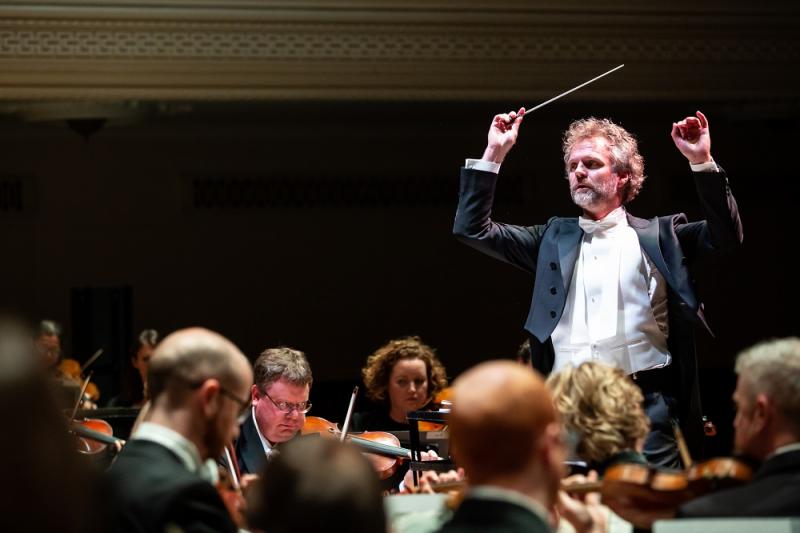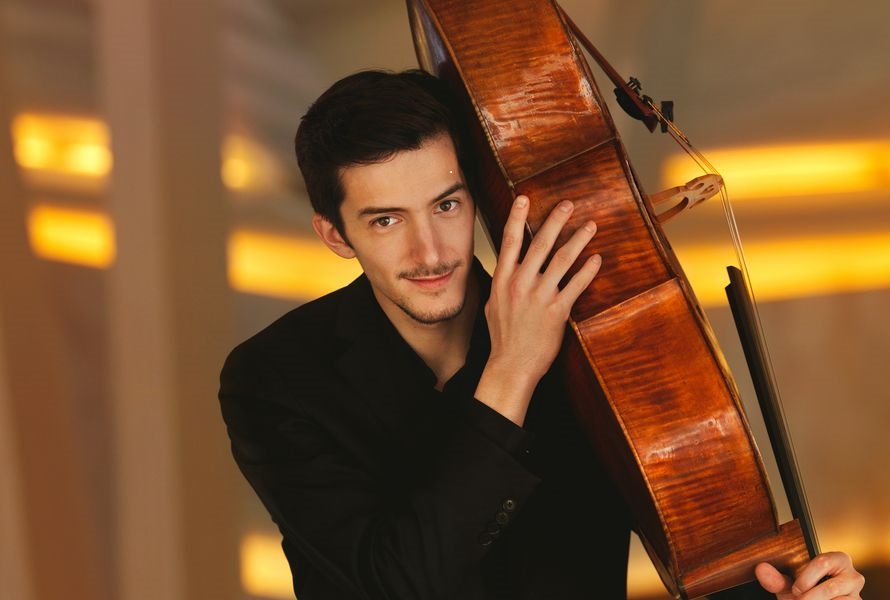Delepelaire, RSNO, Søndergård, Usher Hall, Edinburgh review - festive and magical | reviews, news & interviews
Delepelaire, RSNO, Søndergård, Usher Hall, Edinburgh review - festive and magical
Delepelaire, RSNO, Søndergård, Usher Hall, Edinburgh review - festive and magical
Back to a much-missed venue for an orchestral showcase

“What a lovely sound that was!” declared Music Director Thomas Søndergård, bounding onto the podium of the Usher Hall. He was referring, of course, to the warm applause greeting the Royal Scottish National Orchestra on its first full outing in front of an Edinburgh audience in nigh on 18 months.
Such a thinly populated auditorium doesn’t exactly generate the fizz of celebration (and this is douce Edinburgh, to be sure), but if it wasn’t quite a return to full normality, no-one was complaining. Indeed there was a sense of determination that come what may this concert should be thoroughly enjoyed by all those lucky enough to get tickets – it has been sold out for weeks. The following evening it was repeated in Glasgow, this second performance also being accessible online, both live and subsequently as a recording available until January.
Søndergård explained that his dual themes for this season opener were “festive and magic”. It certainly got off to an exuberant start with not one but two fanfares, the first a very short piece by Matthew Rooke, better known to many as the erstwhile music director of the Scottish Arts Council, though that’s going back a bit. The Isle is Full of Noises!, written for this concert, celebrates the return to live music-making with what sounded like a vast orchestral pirouette, with a chattering moto perpetuo motif in the upper woodwind, orbited by big-tune fragments from the lower strings and brass. It’s all over before you can blink, so the least you could say about it is that it did not overstay its welcome – I would have been happy to hear a bit more.
The piece that followed was given its UK premiere in 1962 by this orchestra in this hall with the composer in the audience: Shostakovich’s Festive Overture is as joyfully shallow as anything this inscrutable composer ever wrote, noisy, witty, irrepressible, cocking a snook at orchestral pomposity. It was actually written in 1954, after the death of Stalin had brought an end to the “reign of terror”, but only a hairsbreadth of nuance separates this piece from the outrageous comedy of Malcolm Arnold’s A Grand Grand Overture written two years later. Stalin was dead, but the chilly hand of the Soviet apparatus was to remain in place for many years yet.  To introduce Tchaikovsky’s Variations on a Rococo Theme at this point in the programme seems a bit like inviting your maiden aunt to join a stag party when you’ve just opened the last magnum of champagne. The mood switched abruptly from boisterous to reflective. The variations open as if politely interrupting a conversation, and continue in the same mildly inquisitive manner as they wind their way through a series of decorative transformations. A much-reduced orchestra was joined by the peerless cellist Bruno Delepelaire (pictured above), principal of the Berlin Philharmonic Orchestra, whose playing was exquisitely rich and sonorous, effortlessly rising above the orchestral backcloth. There was no trace of harshness, or anything more robust than perfectly poised lyricism, but I couldn’t help feeling that what the event really called for at this juncture was something more akin to a pugnacious Prokofiev piano concerto.
To introduce Tchaikovsky’s Variations on a Rococo Theme at this point in the programme seems a bit like inviting your maiden aunt to join a stag party when you’ve just opened the last magnum of champagne. The mood switched abruptly from boisterous to reflective. The variations open as if politely interrupting a conversation, and continue in the same mildly inquisitive manner as they wind their way through a series of decorative transformations. A much-reduced orchestra was joined by the peerless cellist Bruno Delepelaire (pictured above), principal of the Berlin Philharmonic Orchestra, whose playing was exquisitely rich and sonorous, effortlessly rising above the orchestral backcloth. There was no trace of harshness, or anything more robust than perfectly poised lyricism, but I couldn’t help feeling that what the event really called for at this juncture was something more akin to a pugnacious Prokofiev piano concerto.
The magic in Søndergård’s programme came after the interval, with Stravinsky’s complete ballet score for The Firebird – the suite, he points out, misses out the best bits. It is certainly a mesmerising, hallucinogenic score, with delicate textures and sparing use of the full orchestra – those chiefly familiar with the great declamation of the final movements, with overarching brass and tub-thumping percussion, would be surprised at how subtle and mysterious the previous half-hour can be. It’s a real showcase, with notable solos for flute, horn, harp, viola, and bassoon, to name but a few, and it gave Søndergård an opportunity to shine a light on every section of the orchestra and demonstrate just how vibrant and responsive this band can be.
An important evening, then, but several steps short of momentous. We left satisfied, but not overwhelmed. As we swept out of the great double doors of the Usher into the cold night air, a member of staff beamed at us and said: “It’s so wonderful to have you all back”, which indeed it was.
rating
Explore topics
Share this article
The future of Arts Journalism
You can stop theartsdesk.com closing!
We urgently need financing to survive. Our fundraising drive has thus far raised £49,000 but we need to reach £100,000 or we will be forced to close. Please contribute here: https://gofund.me/c3f6033d
And if you can forward this information to anyone who might assist, we’d be grateful.

Subscribe to theartsdesk.com
Thank you for continuing to read our work on theartsdesk.com. For unlimited access to every article in its entirety, including our archive of more than 15,000 pieces, we're asking for £5 per month or £40 per year. We feel it's a very good deal, and hope you do too.
To take a subscription now simply click here.
And if you're looking for that extra gift for a friend or family member, why not treat them to a theartsdesk.com gift subscription?
more Classical music
 Robin Holloway: Music's Odyssey review - lessons in composition
Broad and idiosyncratic survey of classical music is insightful but slightly indigestible
Robin Holloway: Music's Odyssey review - lessons in composition
Broad and idiosyncratic survey of classical music is insightful but slightly indigestible
 Classical CDs: Wolf-pelts, clowns and social realism
British ballet scores, 19th century cello works and contemporary piano etudes
Classical CDs: Wolf-pelts, clowns and social realism
British ballet scores, 19th century cello works and contemporary piano etudes
 Bizet in 150th anniversary year: rich and rare French offerings from Palazzetto Bru Zane
Specialists in French romantic music unveil a treasure trove both live and on disc
Bizet in 150th anniversary year: rich and rare French offerings from Palazzetto Bru Zane
Specialists in French romantic music unveil a treasure trove both live and on disc
 Scottish Chamber Orchestra, Ibragimova, Queen’s Hall, Edinburgh review - rarities, novelties and drumrolls
A pity the SCO didn't pick a better showcase for a shining guest artist
Scottish Chamber Orchestra, Ibragimova, Queen’s Hall, Edinburgh review - rarities, novelties and drumrolls
A pity the SCO didn't pick a better showcase for a shining guest artist
 Kilsby, Parkes, Sinfonia of London, Wilson, Barbican review - string things zing and sing in expert hands
British masterpieces for strings plus other-worldly tenor and horn - and a muscular rarity
Kilsby, Parkes, Sinfonia of London, Wilson, Barbican review - string things zing and sing in expert hands
British masterpieces for strings plus other-worldly tenor and horn - and a muscular rarity
 From Historical to Hip-Hop, Classically Black Music Festival, Kings Place review - a cluster of impressive stars for the future
From quasi-Mozartian elegance to the gritty humour of a kitchen inspection
From Historical to Hip-Hop, Classically Black Music Festival, Kings Place review - a cluster of impressive stars for the future
From quasi-Mozartian elegance to the gritty humour of a kitchen inspection
 Shibe, LSO, Adès, Barbican review - gaudy and glorious new music alongside serene Sibelius
Adès’s passion makes persuasive case for the music he loves, both new and old
Shibe, LSO, Adès, Barbican review - gaudy and glorious new music alongside serene Sibelius
Adès’s passion makes persuasive case for the music he loves, both new and old
 Anja Mittermüller, Richard Fu, Wigmore Hall review - a glorious hall debut
The Austrian mezzo shines - at the age of 22
Anja Mittermüller, Richard Fu, Wigmore Hall review - a glorious hall debut
The Austrian mezzo shines - at the age of 22
 First Person: clarinettist Oliver Pashley on the new horizons of The Hermes Experiment's latest album
Compositions by members of this unusual quartet feature for the first time
First Person: clarinettist Oliver Pashley on the new horizons of The Hermes Experiment's latest album
Compositions by members of this unusual quartet feature for the first time
 Gesualdo Passione, Les Arts Florissants, Amala Dior Company, Barbican review - inspired collaboration excavates the music's humanity
At times it was like watching an anarchic religious procession
Gesualdo Passione, Les Arts Florissants, Amala Dior Company, Barbican review - inspired collaboration excavates the music's humanity
At times it was like watching an anarchic religious procession
 Classical CDs: Camels, concrete and cabaret
An influential American composer's 90th birthday box, plus British piano concertos and a father-and-son duo
Classical CDs: Camels, concrete and cabaret
An influential American composer's 90th birthday box, plus British piano concertos and a father-and-son duo
 Cockerham, Manchester Camerata, Sheen, Martin Harris Centre, Manchester review - re-enacting the dawn of modernism
Two UK premieres added to three miniatures from a seminal event of January 1914
Cockerham, Manchester Camerata, Sheen, Martin Harris Centre, Manchester review - re-enacting the dawn of modernism
Two UK premieres added to three miniatures from a seminal event of January 1914

Add comment